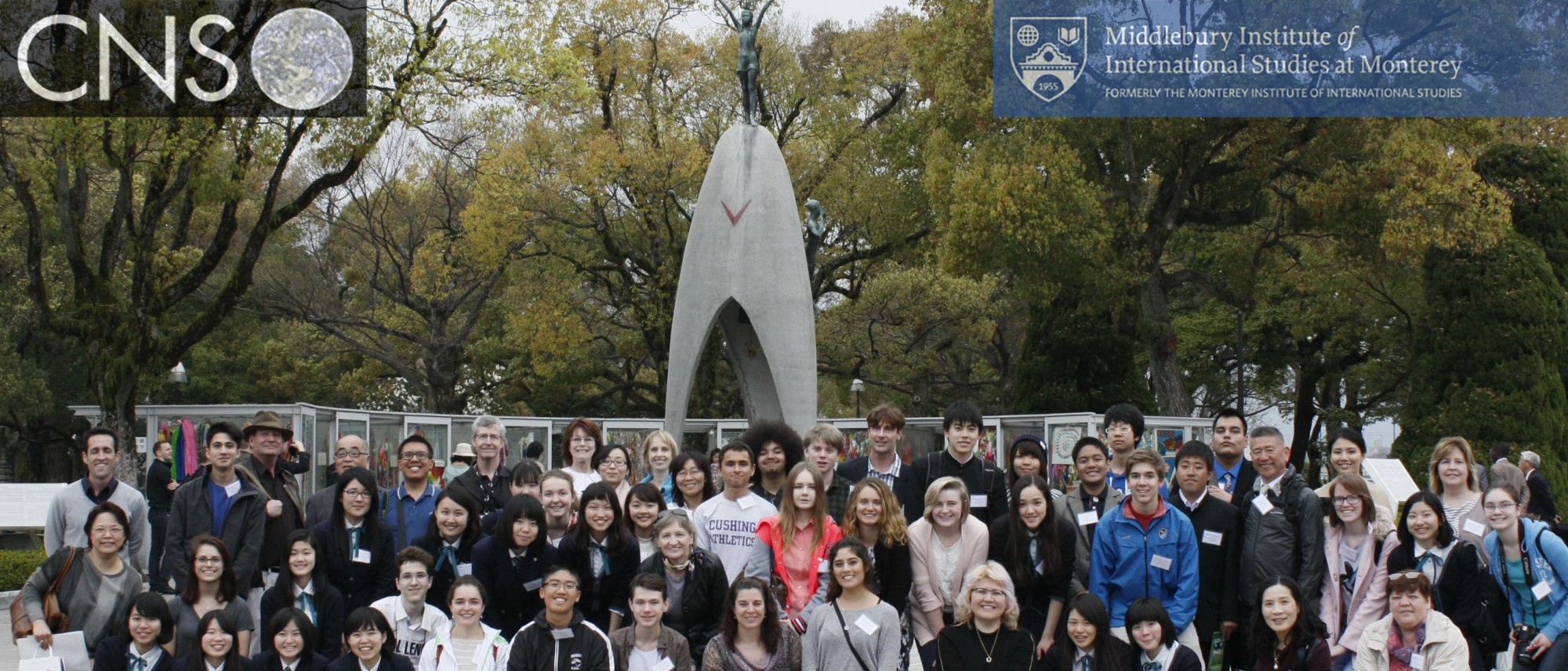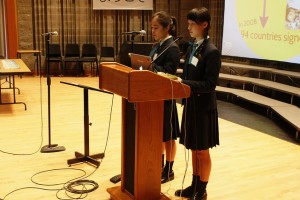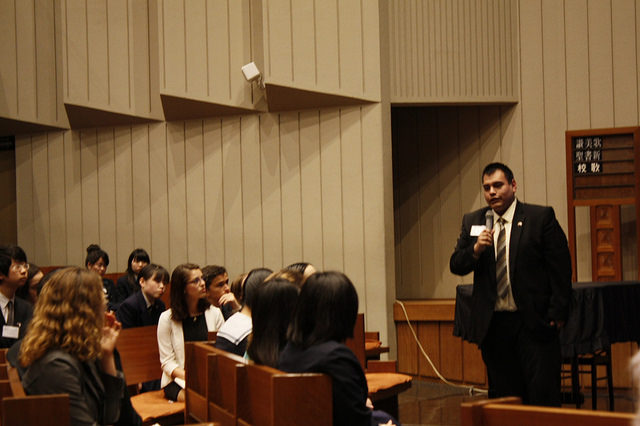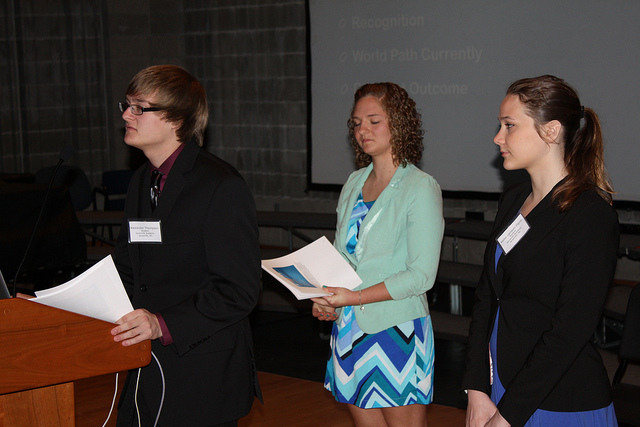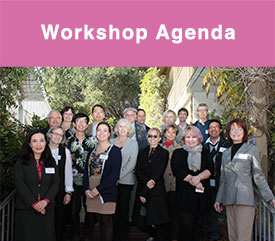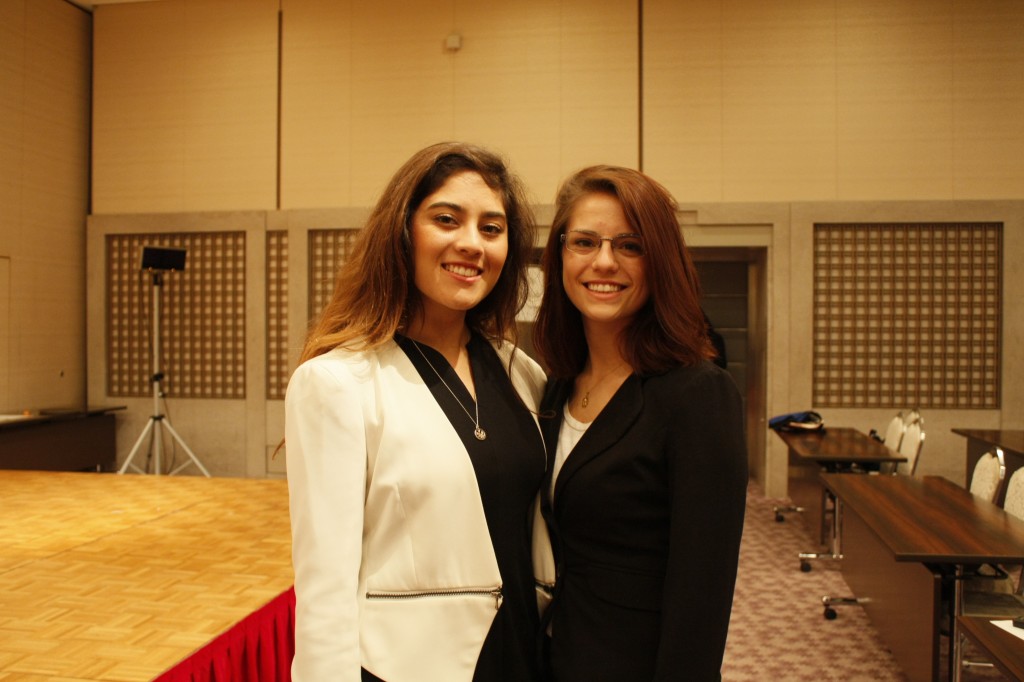
Laura Colosky (right), with fellow student Shaden Beltran at CIF students conference in Hiroshima, April 2015.
Laura Colosky was a student at Santa Catalina School in Monterey, California, when she attended the CIF Spring Conference in Hiroshima, Japan.
While there, Laura learned that there are many ways to approach solving a problem. Everyone who attended the conference researched the same material, delving into nuclear weapon history and treaties, but for Laura the truly poignant part of each presentation was the final solution each group offered. Some chose to seek revisions of various treaties or drafted new ones, while others sought to incorporate values that promote peace through education, and still others suggested raising awareness by using social media like Facebook, Instagram, and twitter. There are so many ideas available when students come together from all over the world to discuss and collaborate. It was an amazing experience.
Laura liked how each student had a unique perspective to contribute to the cause of the peace and security of a nuclear free world, and, by sharing a common goal, students were able to connect to one another regardless of any cultural barriers. They were at the conference for one reason; to help create peace, and with that shared objective the students were able to develop meaningful friendships.
A moment Laura will forever take to heart was when the students listened to and spoke with a Hiroshima atomic bomb survivor. Laura really felt that she was meant to hear her story so that she could learn from her. This gentle and charismatic 78 year old woman described in detail the trauma she suffered when she was just eight years old. She was walking to school one early morning when, in an instant, she was blinded by scorching white light, badly wounded from the surrounding debris that had scattered in all directions. When she regained her senses of sight and hearing she found herself amidst hundreds of dead, dying, and terribly wounded people all frantically seeking medical attention, shelter, and safe food and water. This graphic recollection made everything Laura had studied for the last few months seem dull in comparison. The Hiroshima atomic bomb incident was no longer just a far off piece of history that she was not connected to, but an event occurring in front of her through this woman’s memory.
Not only did she talk about her experience during the bombing, but the shame and guilt she carried throughout her life afterwards; those who survived were stigmatized by the unaffected communities rather than supported and uplifted as Laura had expected. As she watched the hibakusha relive her experiences, Laura could only imagine a fraction of the unbearable pain and despair she must have felt. Laura was shocked that such unnecessary pain and suffering could be inflicted in less than a second.
Before she began this journey, Laura grew up believing in the security and safety nuclear weapons provided America with. Now she has come to the realization that the development of nuclear weapons has only given rise to more fear and mistrust in the global community, and that out of fear the darkest creations of mankind emerge.
Stumbling upon this truth in a most personal experience has inspired Laura to seek peaceful methods of rebuilding trust and diminishing fear within the American and Japanese communities. Together, youth leaders from both cultures can raise awareness by participating in the origami challenge and using the social media tools available. By folding a paper crane in memory of Sadako’s struggle to survive, and posting it to Instagram, Facebook, or twitter, anyone can be part of the movement to abolish nuclear weapons. Signing petitions or writing letters to politicians seeking the abolition of nuclear weapons is also a great option for future leaders.
As Abraham Lincoln once said, “The best way to destroy an enemy is to make him a friend.” By starting with students like Laura and other young people worldwide, the U.S. and Japan can rebuild the bridges of trust to create a more peaceful, prosperous society wherein nuclear weapons do not need to exist.
